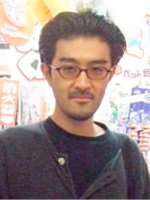Akira Takayama | Director
 Born in 1969. From 2002, Takayama formed Port B, a group especially aiming at the collaboration with artists who exhibit forms of expression apart from the theatre genre. By this, Port B. has been continuously presenting innovative works that go far beyond the scope of conventional theatre. One of the main locations of Takayama’s recent works is the Ikebukuro / Sugamo area close to their workbase, the Nishi-Sugamo Arts Factory. With their trilogy centering around the “Sunshine 60” building in Ikebukuro, one of the main symbols of Japan’s postwar history, consisting of the stage work “Clouds. Home.”, the tour performance “Sunshine 62” and the theatrical installation “Arechi”, they have attracted attention not only among theatre spectators but also in the world of contemporary art. The compilation “Clouds. Home.” and “Sunshine 63” was re-created and staged together at Festival/Tokyo 09 Spring, gaining critical acclaim.
Born in 1969. From 2002, Takayama formed Port B, a group especially aiming at the collaboration with artists who exhibit forms of expression apart from the theatre genre. By this, Port B. has been continuously presenting innovative works that go far beyond the scope of conventional theatre. One of the main locations of Takayama’s recent works is the Ikebukuro / Sugamo area close to their workbase, the Nishi-Sugamo Arts Factory. With their trilogy centering around the “Sunshine 60” building in Ikebukuro, one of the main symbols of Japan’s postwar history, consisting of the stage work “Clouds. Home.”, the tour performance “Sunshine 62” and the theatrical installation “Arechi”, they have attracted attention not only among theatre spectators but also in the world of contemporary art. The compilation “Clouds. Home.” and “Sunshine 63” was re-created and staged together at Festival/Tokyo 09 Spring, gaining critical acclaim.
Port B.’s technique of rearranging media extracts, memories and sceneries from urban spaces and contemporary society, they explore the possibilities of contemporary theatre in permanent search for the ‘things to come’. Takayama’s work is shown currently shown at festivals and exhibitions in Japan and abroad and raising many expectations for the future.
Port B
Theatrical unit formed in Tokyo by Akira Takayama in 2002, using the theatre method that Takayama studied in Germany as a springboard. Several things can be mentioned as characteristic features of the practical theatre works of Port B, such as project-oriented productions, which extend over a half or a whole year (slow process with numerous redundant efforts), members from various fields other than theatre industry, such as music, art, film, dance, literature, philosophy and architecture, training of "unprofessional" actors, trans-border activities which do not remain in the existing realms of theatre, performances in the places outside theatres, pursuit of monologue and chorus, using texts from poetry and prose, deeper consideration for documentary and authentic performances, and a study of methods for adaptation, including quotations and translations.




